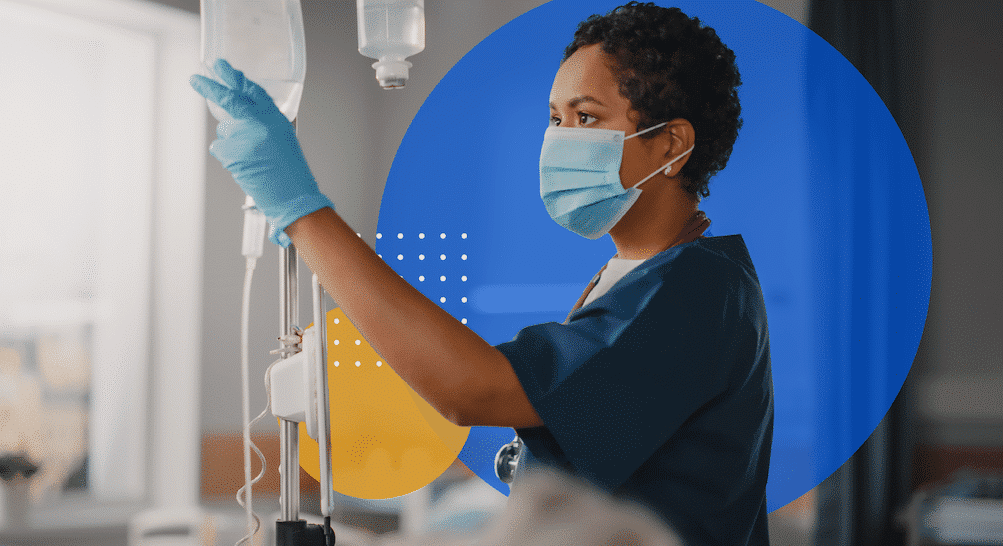Blog
6 Ways EHR systems impact home care agencies

Tech advancements continue to revolutionize how client data is stored, accessed, and utilized in the home care industry. Electronic Health Records (EHR) have emerged as a game-changer, streamlining operations and improving client outcomes.
In this blog, we explore how EHR systems can empower home care agencies, unleashing a wave of operational efficiency and enhancing the quality of care provided to clients in the comfort of their homes.
1. Seamless information sharing
Effective communication and information sharing are crucial to ensure effective coordination among care providers. EHR systems serve as a centralized platform that facilitates the seamless sharing of client information among healthcare professionals, reducing the risk of miscommunication and enhancing care coordination. To have real-time access to client data, caregivers can make informed decisions, collaborate more efficiently, and deliver personalized care tailored to the individual’s unique needs.
2. Enhanced documentation and accessibility
Gone are the days of sifting through piles of paper documents to find client records. EHR systems provide a digitized solution, enabling home care agencies to create, manage, and retrieve electronic documentation effortlessly.
This digital format offers multiple benefits, including:
- improved legibility,
- reduced errors,
- and simplified record-keeping.
With EHRs, caregivers can easily access comprehensive client histories, including medical conditions, medication lists, allergies, and previous treatments. Ultimately, EHRs can empower caregivers to provide more accurate and effective care.
See how Community Advantage Rehabilitation streamlines clinical documentation and real-time share information among multiple home care service providers within one centralized platform:
3. Time and cost savings
Home care agencies often face challenges related to time management and cost efficiency. Implementing EHR systems can significantly alleviate these concerns. Automating various administrative tasks, such as appointment scheduling, billing, and claims management, enables caregivers to focus more on delivering quality care rather than being burdened by paperwork.
Digital records also eliminate the need for physical storage and reduce the costs associated with printing, copying, and transporting documents. Not to mention, these time and cost savings can help increase operational efficiency and financial sustainability.
Learn more about automating various administrative tasks for better care management.
4. Real-time data for informed decision-making
One of the most significant advantages of EHR systems is capturing and analyzing real-time client data. By leveraging this data, home care agencies can gain valuable insights into client trends, treatment outcomes, and caregiver performance. This information empowers agencies to make data-driven decisions, optimize care plans, and allocate resources more efficiently.
Likewise, advanced analytics tools integrated into EHR systems enable agencies to identify potential risks, prevent readmissions, and proactively address emerging healthcare needs, enhancing overall client care and safety.
See how MedTec used real-time data for informed decision-making →
5. Enhanced client engagement
Fostering client engagement is essential for achieving positive health outcomes. EHR systems are a big player in enhancing client engagement by offering interactive portals and mobile applications.
These tools:
- allow clients to access their health records,
- communicate with their caregivers,
- schedule appointments,
- and receive educational resources
All from the comfort of their homes!
With enhanced client engagement, these tools promote self-care, improve medication adherence, and strengthen the client-caregiver relationship. As a result, it leads to better health outcomes.
6. Interoperability and collaborative care
Effective care coordination relies on the seamless exchange of information across home care and healthcare settings. Some EHR systems support interoperability, meaning home care agencies can connect and exchange client data with hospitals, laboratories, pharmacies, and other healthcare providers – as well as other software systems your agency uses for their operations. It fosters collaborative care, enabling the timely and accurate transfer of client information.
For instance, when a client transitions from a hospital to home care, the EHR system can facilitate the transfer of discharge summaries, medication lists, and follow-up instructions, ensuring continuity of care and reducing the risk of medical errors.
EHR has revolutionized the healthcare industry, and its potential impact on home care agencies is substantial. By leveraging EHR systems, agencies can enhance operational efficiency, improve communication, and streamline documentation.
The benefits extend beyond administrative tasks, empowering caregivers with real-time client data, promoting collaboration among healthcare professionals, and fostering client engagement. As technology advances, the future of home care lies in the transformative power of EHR systems, creating a path towards improved client outcomes and a more efficient and compassionate healthcare system.


